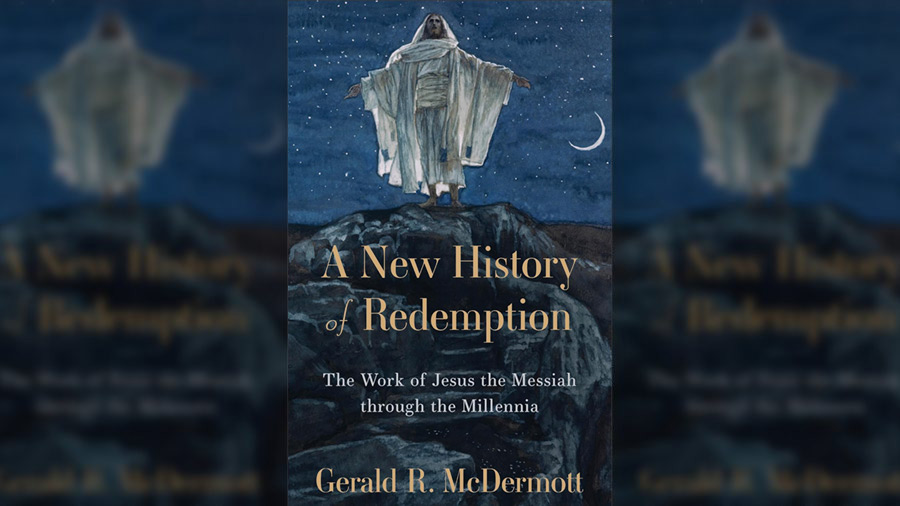“Understanding of the magnificence and beauty of the Triune God in a new, historical way.”
If you’ve ever been on a cruise, river tour, or sailed along the coastline, you realize how dramatically your perspective changes. Instead of the confinement of limited personal space where you can only observe a small area at a time, out on the water looking in, your expanded view lets you take in the land’s beauty and the environment’s scope from a dramatically expanded scale.
Gerald R. McDermott has done this for us in his new book, A New History of Redemption (Baker Academic, 2024, 426 pages with subject and writings index).
McDermott, with his impressive credentials and expertise, is the captain extraordinaire for this journey. He has a Ph.D. from the University of Iowa and teaches at Jerusalem Seminary and Reformed Episcopal Seminary in Philadelphia. Previously, he taught at Besson Divinity School and Roanoke College and has published two dozen books and hundreds of articles on Jonathan Edwards, world religions, Anglicanism, and the place of Israel in the Judeo-Christian narrative.
In an age of specialization, where experts dissect often unconnected bits and pieces to justify a position and social platforms pump out endless suppositions and bromides, A New History of Redemption provides the “receipts” for a new work that expands our vision and understanding of the magnificence and “beauty of the Triune God in a new, historical way.”
The Big Picture
In an audacious, humbling task, McDermott concedes, “[trying] to map the logic of the Bible and the Great Tradition that has given us a way to interpret the Bible” without undermining the Holy Scripture.
“I presume the coherence and beauty of the Christian vision of the Triune God, as passed down to us through Scripture and tradition [which I am seeking to], explain its coherence in a way that I’ve not seen previously.”
His motivation for the book was the enormously influential eighteen-century preacher and theologian Jonathan Edwards (1703–58), whose sermon series “A History of Redemption” fit with McDermott’s realization that earlier in his studies, he “had missed the profound Jewishness of Jesus and the gospel.” Like Jonathan Edwards, McDermott was persuaded that we serve a “God of history” and that history was a transmission belt — through all cultures — to best display God’s beauty.
The author immediately fends off arrows by asking the impatient “historical-critical” practitioners to be patient and read on.
“At its heart, this book is a biblical theology. It is a big picture in which every part is connected to every other part.” That is the way of redemption.
Counsels of Redemption
For many of those, like this reviewer, who came to faith well into adulthood, it was not a conversion of the intellect (though there is nothing so intellectual as the ways of the God we worship). Most of us had read all the philosophical arguments arrayed like cannons in a fortress for and against the Gospel. No, many of us woke up one fine day because of something we heard, a soft whisper or the Holy Love song. Then, like the last click on a combination lock, the indescribable magnificence of God’s created and moral order swung open like a door. Behind it was Reality itself, which was more real than anything you could hold in your hand and more profound in its persuasion for it.
This is where McDermott leads us. He points us to the immense plan of redemption devised in the “‘counsels of redemption’ among the three divine Persons.” Everything unfolded in the Garden of Eden and the Fall, and will continue until history is finished. In every chapter, he details the fruit and the work of redemption and its connections in the history of the faith and nations preparing for that final day. Like a master map maker, he surveys the march of redemption throughout Israel, the coming of the Messiah — the Christ — and lines out the redemptive religious practices of both the Jews and Christians, fixes the borders of both secular and religious interaction and history, other world religions, continuing right up to our time and beyond.
Every Event a Link
McDermott offers a refreshing retelling of God’s plan — of the narrative of all Creation — of the reconciliation of a lost world through the tapestry of history. A history that is always different from the history one would anticipate or expect — carried out by people we’d never suspect.
The book is well laid out in six parts: From Eternity to the Dispersal of the Nations; From Abraham to Moses; From Moses to the Incarnation; The Incarnation; From Christ’s Resurrection to the End of the World; and The Eschaton.
It is presented without scholarly pretension and with impressive diligence to help the reader see beneath the surface, with notes and an excellent index. The New History of Redemption builds a systematic and logical connection between the chapters and the parts. And there is no chapter where even diligent students of Scripture won’t find new nuggets of information and affirmation.
McDermott has the last word. “Every event in history is a link on a gigantic chain, the first link from God and the last going to God.”


1 comment
What a daunting challenge for the author and what an inspiring review, Michael! Thank you for bringing this fine work to our attention.